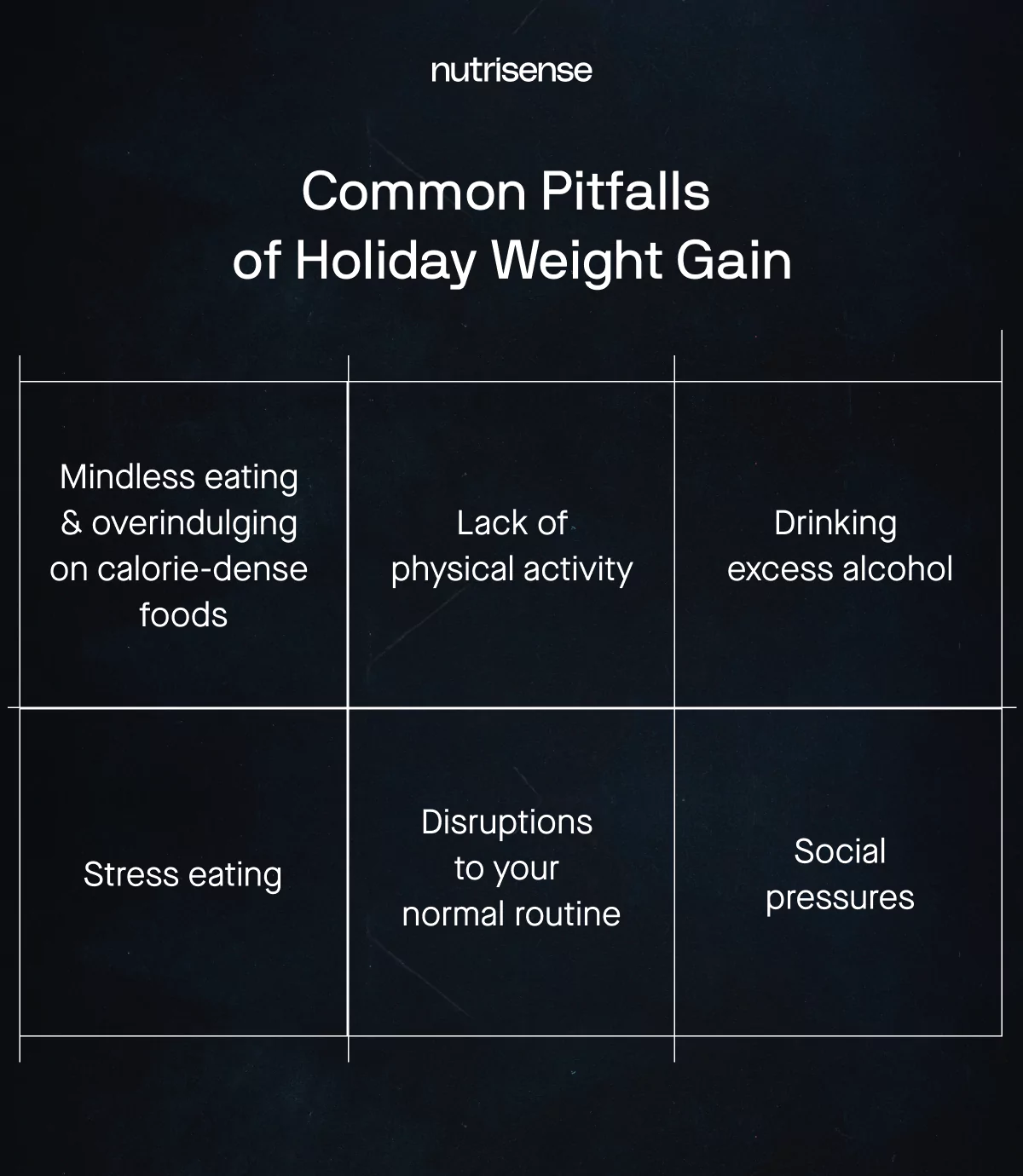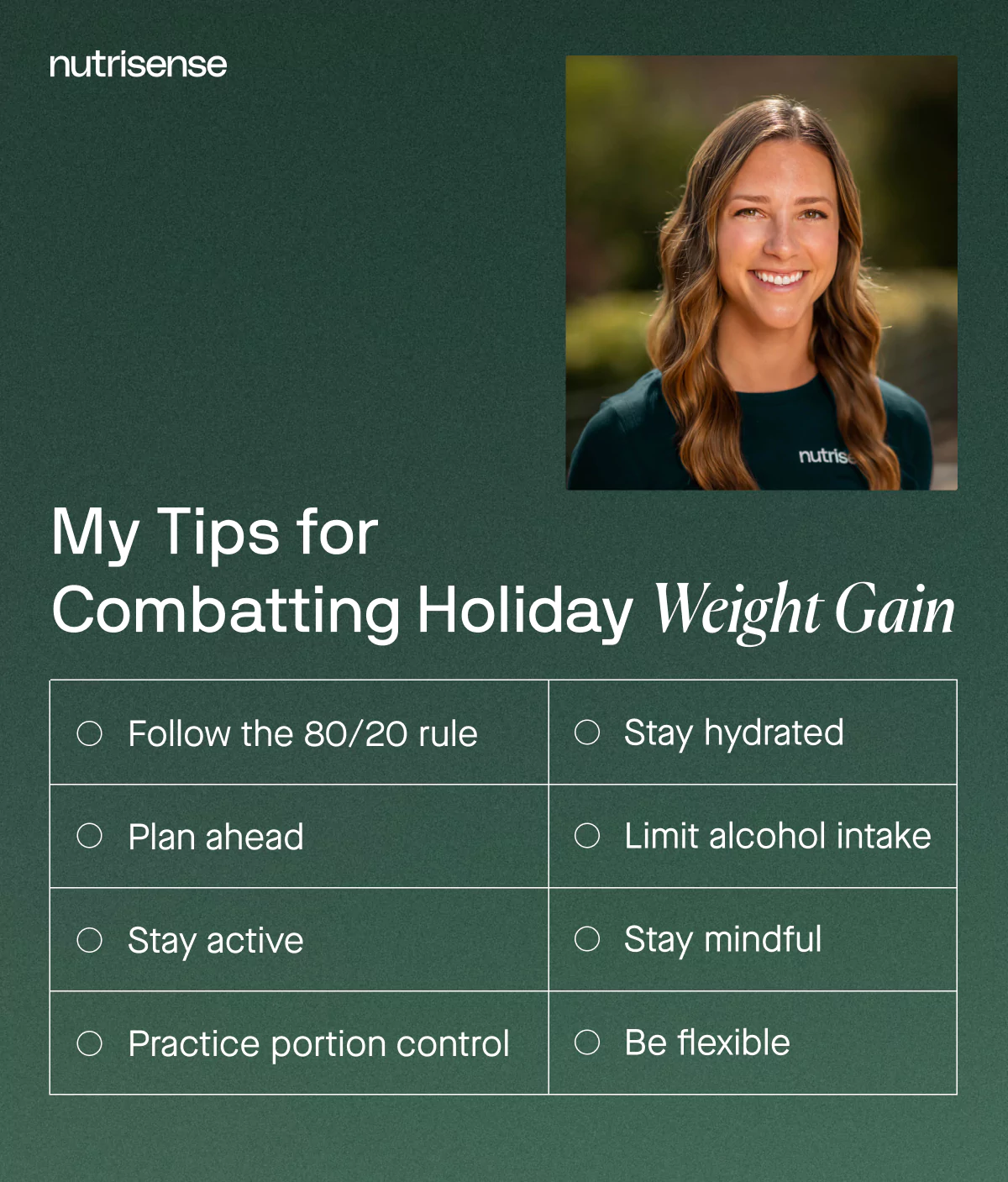A Dietitian's Guide to Enjoying the Holidays without the Holiday Weight Gain

Key Takeaways
It's almost that time of the year again! With the holidays on our minds, it's a good time to start making action plans to stay on track with your health goals through the season. There was a time when, around the holiday season each year, I would find myself stuck in the extremes when it came to my diet. For some years, my dedication to my nutrition and health goals led me down a path of over-restriction when it came to holiday eating. I would meticulously log my calories and macros to try to stay on track, and instead of getting any wins there, I just missed out on some of the joys and connections around the holidays.
Other years, there were times when I threw caution to the wind, tried to embrace the festivities, and let myself enjoy this time of year with no limitations. On these occasions, my overindulgence would leave me ridden with guilt, and I’d feel fatigued and unwell.
Even as a registered dietitian, finding a sweet spot between these two extremes was still a struggle that I faced. I think many people can relate to that uneasy feeling—especially if you have a weight loss goal you’ve been working towards.
But now, after taking time to reframe my mindset, I’ve been able to reach a sustainable middle ground focused on mindfulness rather than restriction. I’ve found that once I could change my outlook, I no longer had to think about balance—it now comes more naturally.
I’ve learned to embrace the holiday season while still honoring my personal health goals—and I want to empower others to reach this same place. So, let's navigate this holiday season together and discover the common pitfalls that can lead to holiday weight gain and the healthy tips I’ve used to turn these festive celebrations into moments of genuine enjoyment.
Understanding the Common Pitfalls of Holiday Weight Gain
When it comes to the holidays, there are some common pitfalls that many people encounter—and almost all of them are things I’ve experienced firsthand on my journey. These pitfalls underscore the importance of mindful eating and proactive strategies to navigate the holiday season without compromising your health goals, and include things like:

- Mindless eating and overindulging on calorie-dense foods
- Stress eating
- Lack of physical activity
- Drinking excess alcohol
- Social pressures
- Disruptions to your normal routine
As to be expected, the holiday season is often full of high-calorie or sugary treats like pumpkin pie or eggnog that seem to beckon from every corner. With a constant stream of food available at parties and gatherings, I often found it easy to lose track of my portion sizes and how much I was consuming. The lack of a routine during the holidays was another factor that I struggled with, and for some people, this can lead to unwanted weight gain during holidays.
Disrupted schedules, less regular exercise, and increased stress levels can lead to mindless eating and poor food choices. The bottom line is that many factors can make navigating the holidays challenging, regardless of whether you have a weight loss goal in mind or just want to stay healthy during this season. But learning how to cope with these pressures will help you stay on track with your health goals.
Is It Normal to Gain Weight Over the Holidays?

As someone who's been conscious of weight gain during the holiday season and worked with hundreds of clients with the same concerns, I've come to realize that it can be remarkably common. Weight gain over the holidays can be a very real thing—especially if you find yourself off track from November to January!
But if you’re taking a few precautions and keeping some extra practices in mind to achieve a healthy balance, a few extra pounds here and there can be a result of temporary water retention and increased food volume in the digestive system. However, this is more likely to be true if you see your weight shift over a shorter span of a few days.
If it persists over several months, this is more likely to be true weight gain. But recognizing this notion has shifted my perspective, allowing me to savor the season without unnecessary guilt and resume my everyday habits once the new year rolls around.
It’s important to keep in mind that we all have our own unique health goals—some people may find themselves on a weight loss journey, and others may simply have weight maintenance in mind. Either way, remember not to panic if you see a slight increase on the scale. Instead, it’s more about focusing on the bigger picture and enjoying things in proper moderation rather than striving for perfection.
Looking for healthy holiday recipes? Download our Healthier Holiday Classics E-book here
My 8 Tips for Combatting Holiday Weight Gain

Here are some tips that I now follow to prevent excessive holiday weight gain and keep myself on track to maintain a healthy lifestyle to reach my health goals.
1) Follow the 80/20 Rule
I’ve found that following the 80/20 rule is one of the best ways to stay on track to reach any health or wellness goal–but it can be especially valuable during the holiday season. "Everything in moderation" sounds nice, but it can also be vague and subjective. Instead, focusing on the 80/20 rule gives you a real framework to work off of to stay on track.
This means that while allowing yourself to enjoy some sweet treats and tasty meals, you should still aim to make sure 80 percent of your meals align with your regular health routine and goals. To put this into practice, I enjoy a small portion of my favorite treats and fill the other 80 percent of my plate with nutritious foods.
I also prioritize getting plenty of protein and non-starchy vegetables in and then add in smaller amounts of other foods. Remember, it’s all about balance!
2) Plan Ahead
During the holiday period, I also try to plan ahead when it comes to certain meals to help me make sure I stick to my plan, make better food choices, and avoid overeating. For me, this looks like having a light snack of fiber and protein before a holiday party.
Eating a healthy snack before attending an event that I know may have lots of high-calorie treats can help keep my blood sugar levels regulated and can curb my appetite so that I avoid mindless eating.
3) Stay Active

I always try to incorporate physical activity, such as a morning hike or a post-meal walk, into my holiday routine. This is a great way to take advantage of the festive atmosphere and spend extra time with loved ones—by doing these activities together.
Remember that exercise isn't a punishment and shouldn’t be used as a way to burn calories after eating. Instead, consider how it will help you feel better and more energized after a big meal!
4) Practice Portion Control
As I mentioned earlier, moderation is key. While I love to enjoy my favorite holiday foods as much as the next person, I always try to do so in moderation. I like to start by making sure I include a variety of colorful veggies and lean protein on my plate and then opt for smaller portions of high-calorie foods and sweet treats.
You can also try taking smaller portions of things first by using smaller plates rather than larger ones, keeping in mind that you can always go back later and get more if you want to.
5) Stay Hydrated
Drinking adequate water throughout the day can help you feel fuller and avoid overeating. While more research is still needed, some studies show a moderate connection between water intake and weight loss in certain populations.
I aim for at least eight glasses of water daily, but this can change based on how active I am throughout the day.
6) Limit Alcohol Intake

Alcoholic beverages can be high in calories and can lower your inhibitions, making it easier to push your healthy habits to the side and indulge your cravings. While the occasional drink can be fun to share with friends, limiting your alcohol intake can make it easier to stay on track during the holidays.
So, instead of reaching for beer and wine, I tend to opt for healthier alternatives, such as infused water, herbal tea, or even a healthy mocktail.
7) Stay Mindful
Pay attention to your body's hunger and fullness cues, and practice mindful eating with your holiday meals. When I’m with my loved ones enjoying a meal, I try to keep these tips in mind:
- Slow down and savor each bite
- Stop eating when I feel satisfied rather than overly full
- Avoid multitasking while eating
- Avoid grazing while cooking or chatting with friends
These practices help me avoid overeating or stress eating, which can lead to low energy levels and blood sugar spikes.
8) Be Flexible
When it comes to the holidays, understand that perfection is not the goal and that occasional indulgences are part of a balanced lifestyle. I do my best to take my own advice, but at the end of the day, if I get off track or if something unexpected happens, I’m not going to beat myself up about it.
If you do overindulge, accept it, move on, and get back on track with your healthy choices. It’s more about the accumulation of your choices over time rather than singling out one or two events.
Embracing the Holiday Spirit with Added Support

Enjoying the holidays without gaining weight is possible with a few mindful strategies. If you’re someone who needs an added touch of accountability, making use of a fitness tracker or a continuous glucose monitor can make it even easier to ensure that you stick to healthier choices. Remember, the true essence of the holiday season lies in the connections we make and the love we share. But, by understanding common pitfalls, being aware of your choices, and implementing a few mindful tips to combat holiday weight gain, you can stay on track with your health goals while still indulging in the festive atmosphere.
And if you need a little extra help, do what I do! I’ve personally found that leveraging the latest health tech, and focusing on key markers, like real-time blood glucose insights can help me make more informed decisions about my food choices and allow me to make any adjustments needed for my own body. In my experience, having access to this data can:
- Empower you to make healthier choices
- Support long-term, sustainable habits
- Keep you accountable to avoid overindulgence
- Support mindful eating and improved awareness
Of course, the best way to leverage all these insights is to work with an expert to figure it all out. That's why at Nutrisense, we put together a team of glucose-trained experts. Our registered dietitians and nutritionists have worked with over 100,000 members, and have various professional specialties. So whether you're struggling with a little motivation, need support to stay on track, or want an expert to figure out what your action plan should be based on your health conditions or preferences, we've got you with 1:1 video calls aligned to your needs!
Find the right Nutrisense programto turn insight into progress.
Go Beyond Glucose Data with Nutrisense
Your glucose can significantly impact how your body feels and functions. That’s why stable levels are an important factor in supporting overall wellbeing. But viewing glucose isn't enough. Nutrisense, you’ll be able to learn how to use your body's data to make informed lifestyle choices that support healthy living.
One-to-one coaching
Sign up to access insurance-covered video calls to work with a glucose expert: a personal registered dietitian or certified nutritionist who will help tailor your lifestyle and diet to your goals.
Monitor and measure what matters
With the Nutrisense CGM Program, you can monitor your glucose with health tech like glucose biosensors and continuous glucose monitor (CGM)s, and analyze the trends over time with the Nutrisense App. This will help you make the most informed choices about the foods you consume and their impact on your health.
Find your best fit
Ready to take the first step? Start with our quiz to find the right Nutrisense program to help you take control.

Liz has a Master of Science degree in Clinical Nutrition and Integrative Health and is a board-certified nutrition specialist (CNS) and a licensed dietitian nutritionist (LDN). As a nutritionist, Liz has educated and counseled 100s of clients in areas such as weight loss, hormonal imbalances, and gastrointestinal diseases.




